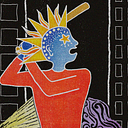“You know, this is quite interesting literature. It’s a peculiar kind of communism, it’s hooligan communism.” — Lenin, on 150 000 000 by Vladimir Mayakovsky
I.
This is not a poem for spectres
and other non-corporeal things,
persisting after defeat.
In these streets stalk
hobgoblins, frightful
gargoyles
with skins of concrete.
Here are the rabble of knaves
and hooligans,
the ugly part of the crowd, outside
the mythologised masses.
Here,
we say: Europe is haunted
by more than workers.
This manifesto,
is not for trade unionists,
trading stock in authenticity
through investment in accents
and pints
and Fred Perry polos
and other invisible clothes
of the labour aristocracy.
We reject their complicity.
It’s not for self appointed
tribune of the plebs,
to sacrifice its words for the wider movement
or people who think
there’s only one way to be bled
or only one way to be led,
demanding no more be said.
This is a poem for the nameless,
these shrieking calibans, whose feet
tell stories through their soles, marking dirt roads
This is for the homeless,
perpetual picaros, the shrapnel collectors,
and those unlucky
to die in the Birmingham snow. Therefore
in the cities we seek,
finding the margins on the streets,
an otherwise
in the underneath.
Through the basement door
we find
rhythms with autonomy
nothing uniform,
for they don’t follow the factory march anymore.
Down here
the lumpenproles
prepare
to take the floor.
We, slipping doven words between prison bars
this ammunition, giving bars, spat like tactile bullets
on the frontline of the class war.
This is not a manifesto made
for readers to click their fingers at,
to let your satisfaction
solidify like syrup around it;
provocations should never sit
easy.
From that, we declare
we do not sit with clean people,
we sit with the cleaners.
We take the side of the many medeas
bathed in the ashes of cradle fires.
We links arms
with murders and thieves
and say,
there are landscapes here,
within.
Stone butch blues sing of many wounds
and we’ll tend them too,
these chimeras, these
genderqueer guerrilas,
our movement holds many things,
and at the lowest level,
we hold many things.
Here’s to hooligans,
singing in chorus
with Crazy Horse to the last violent breath,
who dance in the quiet streets,
to summon the memory of a
riot.
Their make up comes from blazes,
so many, which they are tired of, but still
they dance
Each step, a syllable
of the message they bring.
The hooligans reject their turn
and shout:
we are not the terror,
we are the ones
who kill it.
II.
The person who writes this,
the poet,
is not an authority to be trusted.
He is not a genius, for
his words, reacting with the ariel air,
are soon found rusted.
His voice is only important
in the provoking of what is truthful,
when the ink has dried, when the poem is published,
he ceases to be useful.
If he had to be described;
if we should ever need to speak of a writer
the term best suited for him
is a bull fighter.
He is one
of two violent creatures,
destined to dance, that is,
in matadorial flourishes
if we chose to speak in romance.
He doesn’t dart around his opponent,
but instead,
let’s the bull get closer than he can really afford,
this is because, if you didn’t know,
the deepest wounds are struck,
when you let yourself be gored.
This duo, once sensitive,
are now prime bred to hurt.
And one will have the reward
of dying in the dirt.
His opponent is every other thing like him — alive,
he finds it in the reflection of his enemy’s eyes.
His struggle sits as a problem;
it’s a space
of blood drying in the sun.
Ask yourself,
in the end,
who’s actually won?
The poet,
at best, in the last,
is merely a bullfight,
and
that kind of revolutionary is past.
